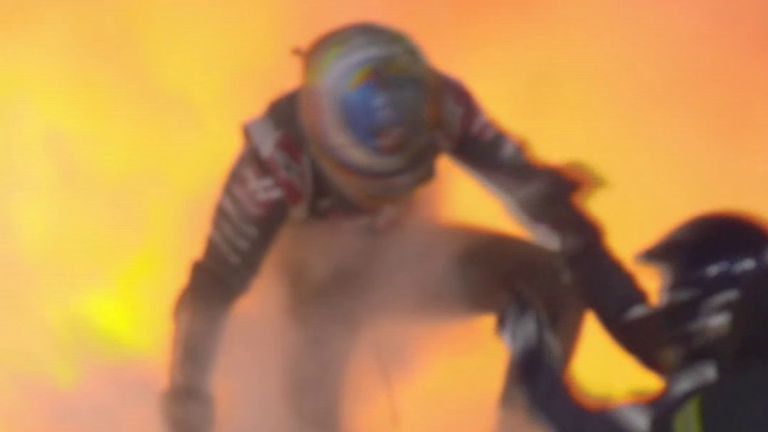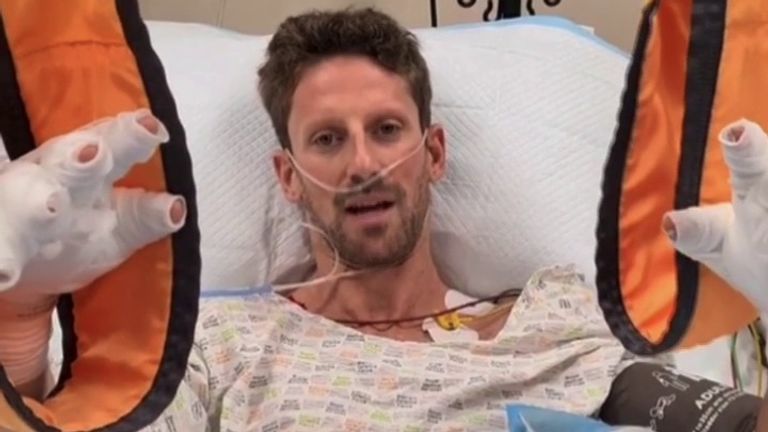Romain Grosjean: F1 horror crash driver says Halo safety device saved his life
The 34-year-old managed to scramble away from huge flames engulfing his car following the dramatic 140mph accident.
Monday 30 November 2020 14:33, UK
Romain Grosjean has said the controversial Halo safety device saved his life after he escaped a dramatic high-speed crash.
The driver spoke from his hospital bed just hours after surviving the most dramatic accident in recent Formula One history during Sunday's Bahrain Grand Prix.
The 34-year-old's car split in two and burst into flames after he pierced through a steel barrier at 140mph following a collision with AlphaTauri's Daniil Kvyat.
The French driver scrambled to get out of his burning wreckage for almost half a minute before leaping to safety.
Despite the force of the impact registering at 53G, Grosjean escaped with just minor burns to his hands.
And the Halo device - a three-pronged titanium protection bar which sits above drivers' heads and was introduced in 2018 - played a significant role in the Frenchman's remarkable survival.
Grosjean said he had been sceptical about its introduction, but had since changed his mind.
"I wasn't for the Halo some years ago but I think it's the greatest thing that we brought to Formula One and without it I wouldn't be able to speak to you today," he said.
The Halo was made mandatory in all races under Formula One's governing body, the FIA, from 2018.
Constructed out of titanium - which has a low density but high strength - it involves a bar that surrounds the driver's head and is connected by three points to the vehicle frame.
It initially faced criticism from some including late former F1 champion Niki Lauda, who said it "destroys the DNA" of the race cars, and fans who suggested it was visually unappealing.
Grosjean was also protected by his race suit, which all Grand Prix drivers wear and are made from a fireproof material called Nomex.
Drivers wearing them can survive temperatures of up to 840C for 35 seconds - with the Frenchman having taken 27 seconds to extricate himself from the burning wreckage.
The Haas driver remained in BDF Military Hospital, 10 miles north of the Bahrain International Circuit, where he was airlifted on Sunday night.
Video showed him with with both his hands in bandages and tubes monitoring his vital statistics.
An investigation into the crash will be launched by FIA, amid questions over how Grosjean's car penetrated a steel barrier, broke in two, and why it caught alight.
FIA race director Michael Masi warned on Sunday that it may be several months before any findings emerged from the investigation.
"I would hate to speculate on why the car burst into flames," he said.
"We will perform a complete investigation from start to finish. It will take weeks, if not months, to look at every single aspect of what happened."
Lewis Hamilton, who has already clinched the world championship, won Sunday's race to claim the 11th victory of the season.
"I am just so grateful the halo worked and the barrier didn't slice Romain's head off," he said.
"It could have been so much worse. It is a stark reminder that this is a dangerous sport. I would be lying if I was to say no, I don't think about my future when I see an accident like that.
"I have been racing 27 years and I was nine when I saw a kid die on the same day I won a race.
"I have always been aware of the dangers and risks that I take and when I get later in life I question it more than perhaps I did when I was in my early 20s."






